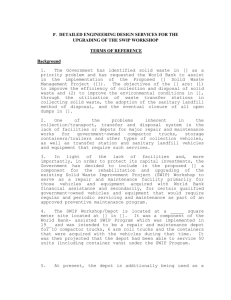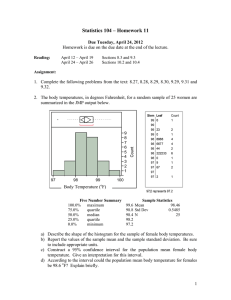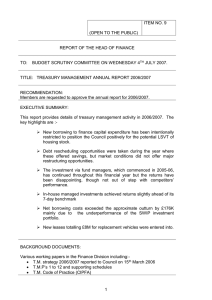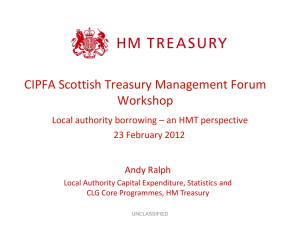PART 1 (OPEN TO THE PUBLIC) REPORT OF THE CITY TREASURER
advertisement
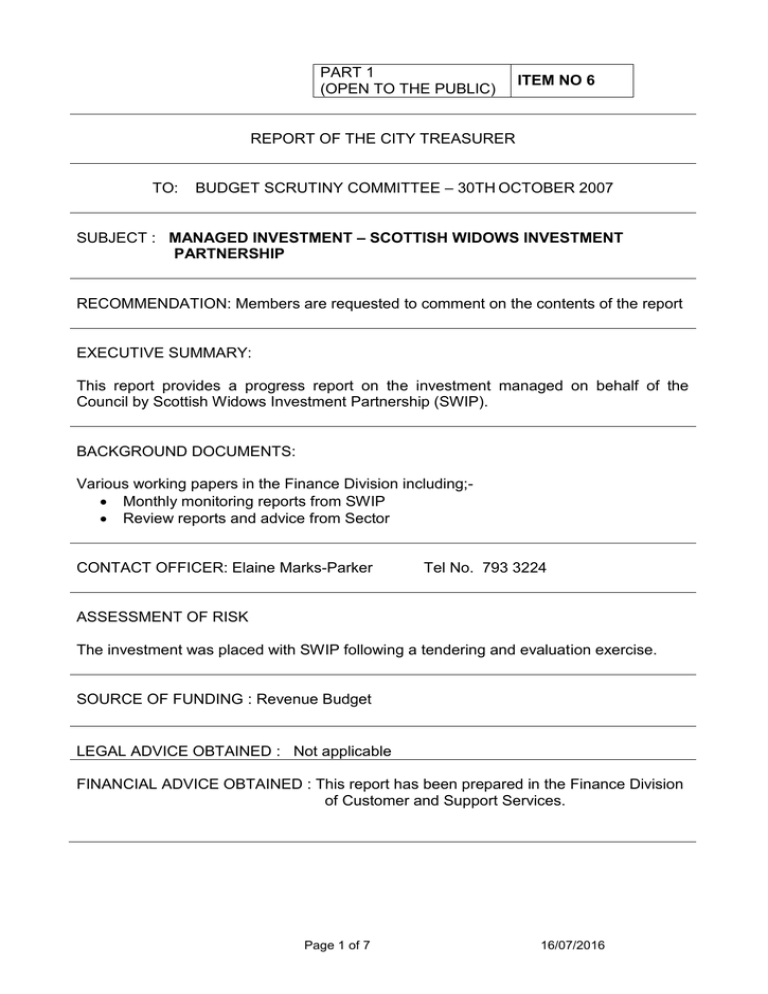
PART 1 (OPEN TO THE PUBLIC) ITEM NO 6 REPORT OF THE CITY TREASURER TO: BUDGET SCRUTINY COMMITTEE – 30TH OCTOBER 2007 SUBJECT : MANAGED INVESTMENT – SCOTTISH WIDOWS INVESTMENT PARTNERSHIP RECOMMENDATION: Members are requested to comment on the contents of the report EXECUTIVE SUMMARY: This report provides a progress report on the investment managed on behalf of the Council by Scottish Widows Investment Partnership (SWIP). BACKGROUND DOCUMENTS: Various working papers in the Finance Division including; Monthly monitoring reports from SWIP Review reports and advice from Sector CONTACT OFFICER: Elaine Marks-Parker Tel No. 793 3224 ASSESSMENT OF RISK The investment was placed with SWIP following a tendering and evaluation exercise. SOURCE OF FUNDING : Revenue Budget LEGAL ADVICE OBTAINED : Not applicable FINANCIAL ADVICE OBTAINED : This report has been prepared in the Finance Division of Customer and Support Services. Page 1 of 7 16/07/2016 BACKGROUND On 8th May 1996 approval was given to appoint Hambros Fund Management plc, later taken over by Investec, to manage a proportion of the Council’s investments for an initial period of two years, with an option to extend subject to their satisfactory performance. A deposit of £20M was placed with the fund managers on 5th July 1996. The performance achieved by the Hambros / Investec fund managers compared to 7 day LIBID are detailed in Appendix 1 to this report and is summarised in Table 1 below showing the number of quarters in each year where Investec’s performance shows a gain or loss compared to 7 day LIBID and the cumulative loss or gain in the year. Table 1. Investec Performance compared to 7 day LIBID Year Qtrs with Gains Qtrs with Losses 1996-1997 0 3 1997-1998 4 0 1998-1999 3 1 1999-2000 1 1 2000-2001 4 0 2001-2002 1 3 2002-2003 4 0 2003-2004 1 2 Total 18 10 Total overall net gain against 7-day LIBID Average annual net gain against 7-day LIBID Cumulative Gain/(Loss) % (0.10) 0.36 2.11 (0.34) 1.53 (0.35) 1.58 (0.81) 3.98 0.54 The investment was recalled in early 2004. The timing coincided with a decision to reschedule debt and repurchase stock to achieve savings built into the 2004-05 revenue budget. This debt rescheduling gave rise to premiums which were financed from interest savings during the life of the replacement loans. The payment of these premiums reduced the balances available for short term investment to the extent that they were insufficient to sustain an external fund manager. In 2005-06, following the accumulation of funds and reserves available for investment, together with a favourable interest rate outlook forecast, a decision was made to re-engage fund managers and externalise a proportion of the Council’s investment portfolio. The investment parameters set for the external fund managers enable them to deal in Government Stocks (Gilts). Fund managers can be expected to outperform cash deposits in an environment where interest rates are expected to fall. In this environment the gilt yield usually falls in advance of a movement in interest rates and this is reflected in an increase in the price of the stock enabling fund managers to achieve a profit from dealing in gilts. Fund managers undertake two types of dealing in gilts, short term tactical deals to take advantage of anomalies in the markets and strategic deals based on their expectations of future movements in the markets. Page 2 of 7 16/07/2016 Interest rate forecasts available in September 2005 are shown in Table 2 below:Table 2 Interest Rate Forecasts – September 2005 suggesting favourable terms for fund managers in base rate and 5-year gilts Q/E3 2005 Q/E4 2005 Q/E1 2006 Q/E2 2006 Q/E3 2006 Q/E4 2006 Q/E1 2007 Q/E2 2007 Base Rate 4.50% 4.50% 4.50% 4.25% 4.00% 4.25% 4.25% 4.50% 5yr Gilt Yield 4.25% 4.25% 4.00% 4.00% 4.25% 4.50% 4.50% 4.75% 10yr PWLB Rate 4.50% 4.50% 4.25% 4.25% 4.50% 4.50% 4.75% 4.75% 25yr PWLB Rate 4.50% 4.50% 4.50% 4.50% 4.50% 4.50% 4.75% 4.75% Source: Sector On 14th December 2005, following a tender exercise and evaluation, a £20M investment was placed with the investment fund managers, Scottish Widows Investment Partnership (SWIP), for a period of up to 3 years subject to satisfactory performance. Investment parameters were set for SWIP as outlined above, which it was anticipated, would utilise the expertise of the fund managers and, consequently, result in better returns than were being achieved by the in-house team. PERFORMANCE The initial investment was made near to the end of Q3 of the 2005-06 financial year. Details of SWIP’s performance against target are contained in Appendix 2 to this report and summarised in Table 3 below. Table 3 SWIP Performance compared to 7 day LIBID demonstrates performance has been disappointing Year No of months - Gains 0 6 2 8 2005-06 (From 14/12/05) 2006-07 2007-08 Total Source: SWIP Valuation Statements ; No of months - Losses 3 6 4 13 Gain/(Loss) (1.83) 0.12 (0.38) (0.30) Sector Bulletins As can be seen from the appendix and the table, SWIP’s performance has been disappointing. Their performance has been subject to review both informally on receipt of monthly valuation statements and formally at quarterly meetings with the fund managers and Sector. Page 3 of 7 16/07/2016 At these review meetings performance against targets have been assessed and the economic factors affecting that performance have been taken into account, as well as the future prospects based on SWIP’s and Sector’s analysis of the market’s economic and interest rate forecasts. At the first review meeting early in the 2006-07 financial year interest rate forecasts suggested that the climate would continue to be favourable and afford fund managers opportunities to improve on their initially poor results during 2006. The forecast available in April and May 2006 are shown in Table 4 below. Table 4 Interest Rate Forecast April/May 2006 base rate forecasts remain favourable Q/E2 2006 Q/E3 2006 Q/E4 2006 Q/E1 2007 Q/E2 2007 Q/E3 2007 Q/E4 2007 Q/E1 2008 Base Rate 4.50% 4.25% 4.00% 4.00% 4.25% 4.50% 4.75% 4.75% 5yr Gilt Yield 4.00% 4.00% 4.00% 4.25% 4.50% 4.75% 5.00% 4.75% 10yr PWLB Rate 4.25% 4.25% 4.25% 4.50% 4.50% 4.75% 4.75% 4.75% 25yr PWLB Rate 4.25% 4.255 4.25% 4.50% 4.50% 4.75% 4.75% 4.75% 50yr PWLB Rate 4.00% 4.25% 4.25% 4.25% 4.50% 4.50% 4.50% 4.50% Source: Sector During 2006 inflation became a major and unexpected (to the money market) issue and the yield of short dated gilts increased. Despite successful tactical trading in the most part, on several occasions the strategic moves were unsuccessful and the losses from those trades more than wiped out the gains from tactical trades. By July 2006, interest rates forecasts had started to harden, with base rate forecasts now at 4.5% during late 2006 and into 2007, against 4% previously forecast for Q1 2007, and similar upward movement in gilt yields. However, opportunities around gilts of up to 10 years duration still remained. The return for 2006-07 was 4.54% (net of fees) compared to the 7 day LIBID benchmark of 4.84%. Page 4 of 7 16/07/2016 Table 5 Interest Rate Forecast July 2006 some opportunities still existed Q/E3 2006 Q/E4 2006 Q/E1 2007 Q/E2 2007 Q/E3 2007 Q/E4 2007 Q/E1 2008 Q/E2 2008 Base Rate 4.50% 4.50% 4.50% 4.50% 4.75% 4.75% 4.75% 4.75% 5yr Gilt Yield 5.00% 4.75% 4.75% 4.75% 4.75% 4.75% 4.75% 4.75% 10yr PWLB Rate 4.75% 4.50% 4.50% 4.50% 4.50% 4.75% 4.75% 4.75% 25yr PWLB Rate 4.50% 4.25% 4.50% 4.50% 4.50% 4.75% 4.75% 4.75% 50yr PWLB Rate 4.50% 4.25% 4.25% 4.50% 4.50% 4.50% 4.50% 4.50% Source: Sector The decision of the Bank of England Monetary Policy Committee (MPC) on 2 nd August 2006 to increase Base Rate to 4.75% took the markets by surprise. The increase was intended to cool the inflationary pressures in the economy. However, the impact on the economy was not as significant as expected and the markets began to expect a further increase in rates around November 2006 followed by falls in mid to late 2007. The predicted increase of ¼% to 5.00% came on 9th November 2006. The markets were again taken by surprise in January 2007 when the MPC announced a further increase of ¼% to 5.25%. However, interest rate predictions following that hike are shown in Table 6 and were still indicating that rates would start to fall by Q3 2007 and continue to fall during 2008. Table 6 Interest Rate Forecast January 2007 more market optimism of future interest rate falls Q/E1 2007 Q/E2 2007 Q/E3 2007 Q/E4 2007 Q/E1 2008 Q/E2 2008 Q/E3 2008 Q/E4 2008 Base Rate 5.50% 5.50% 5.25% 5.00% 5.00% 5.00% 4.75% 4.75% 5yr Gilt Yield 5.50% 5.25% 5.00% 4.75% 4.50% 4.50% 4.50% 4.50% 10yr PWLB Rate 5.00% 5.00% 4.75% 4.75% 4.50% 4.50% 4.50% 4.50% 25yr PWLB Rate 4.50% 4.50% 4.50% 4.50% 4.50% 4.50% 4.50% 4.50% 50yr PWLB Rate 4.25% 4.25% 4.25% 4.25% 4.25% 4.25% 4.25% 4.25% Source: Sector Despite the January 2007 increase in Base Rate inflation continued to rise and the markets anticipated further rate increases. In common with all fund managers SWIP’s performance suffered. Its return in the quarter was 0.91% compared to the 7 day LIBID benchmark of 1.36%, an underperformance of 0.45%. Page 5 of 7 16/07/2016 The expected increases came in May and July 2007 when the MPC increased Bank Rate to 5.50% and then 5.75% where it remains. During the third quarter of the current year the money markets have been very volatile as nervousness over the sub-prime mortgage market in the US has spread across the globe and this has provided some tactical opportunities. The MPC has recently indicated that it wishes to hold Bank Rate at 5.75% for the time being and then examine the relative strength of inflation, housing, high streets and financial markets data before determining its next step. Returns on short dated certificates of deposit have been high compared to gilts which should deter fund managers from moving aggressively in to the gilt markets. The latest valuation statement from SWIP showed a net return at the end of September of 2.47% compared to the 7 day LIBID benchmark of 2.88% for the year to date. FUTURE PROSPECTS FOR INTEREST RATES The latest forecast for interest rates, received from Sector on 24th September, is shown in Table 7 below. Table 7 Interest Rate Forecast September 2007 rates will begin to fall again by 2008 Q/E 3 2007 Q/E4 2007 Q/E1 2008 Q/E2 2008 Q/E3 2008 Q/E4 2008 Q/E1 2009 Q/E2 2009 Q/E3 2009 Q/E4 2009 Base Rate 5.75% 5.75% 5.75% 5.75% 5.75% 5.50% 5.25% 5.00% 5.00% 5.00% 5yr Gilt Yield 5.50% 5.50% 5.45% 5.35% 5.25% 5.05% 5.00% 4.85% 4.85% 4.85% 10yr PWLB Rate 5.30% 5.25% 5.20% 5.05% 4.95% 4.85% 4.75% 4.65% 4.65% 4.65% 25yr PWLB Rate 4.90% 4.85% 4.80% 4.70% 4.65% 4.60% 4.55% 4.55% 4.55% 4.55% 50yr PWLB Rate 4.60% 4.55% 4.50% 4.50% 4.45% 4.45% 4.40% 4.40% 4.40% 4.40% Source: Sector CONCLUSION SWIP’s performance since their engagement has undoubtedly been disappointing, albeit not out of line with the performance of other fund managers during the period of investment. A long term perspective has to be taken with externally managed funds as sudden market changes can have an adverse impact in the short term. Overall performance in the past with Investec demonstrated this to be a successful venture, notwithstanding the fact that they experienced periods of under-performance. Funds were externalised with SWIP in the expectation of favourable market conditions. The economic conditions soon after their appointment started to change with interest rates Page 6 of 7 16/07/2016 beginning to move upwards to combat inflationary pressures. Repeated market expectations that this upward movement in interest rates would not be prolonged have turned out to be false dawns. Conditions for all fund managers have therefore been consistently unfavourable during the period of SWIP’s fund management. This has led to repeated expectations of seeing through the adverse returns on gilts in the belief that better returns were in prospect, hence continuing to remain with SWIP. We are once again in a familiar situation as recent times, whereby future prospects are once again predicting that interest rates will fall and hence gilt prices will increase. It has now become a credibility issue as to whether there can be sufficient confidence in market predictions as to have the confidence to sustain SWIP’s continued appointment. The half-yearly review of SWIP’s performance is due to take place in early December when there will be a critical review of the prospects for better returns, taking account of market forecasts and their credibility. Economic conditions during July, August and September offered favourable opportunities for SWIP to make tactical trades in gilts as prices rose in response to reductions in longer dated interest rates. It is disappointing, therefore, that SWIP did not take advantage of these opportunities in any significant way, only making modest returns. The imminent half-yearly review will be pivotal as to whether we can have sufficient confidence in SWIP’s performance looking ahead to what could be favourable market conditions as to sustain their continued engagement. RECOMMENDATION Members are requested to comment on the contents of this report. JOHN SPINK City Treasurer Page 7 of 7 16/07/2016
